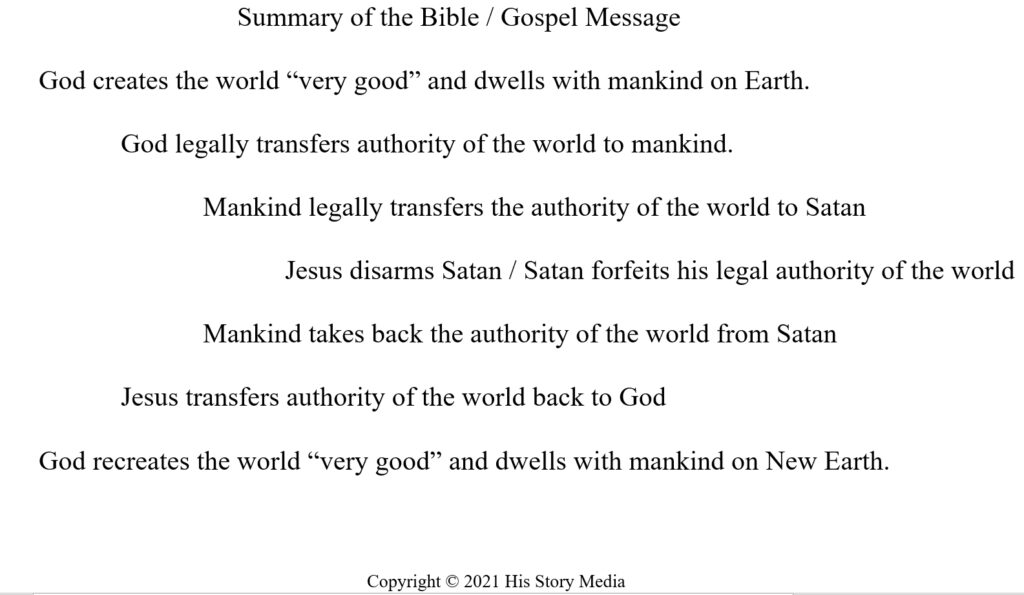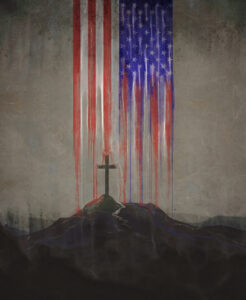The full Armor of God is critical to surviving spiritual warfare. In Ephesians 6, Paul urges Christians to “take up” and “put on” the armor of God. The Greek implies these actions must be done regularly, and disavows the notion that a Christians automatically has this armor of God without any effort on their part.
References to God’s armor are first found in Isaiah 59, but in that passage it is Yahweh himself putting on armor (v.17) and seems to be a Messianic reference to Jesus second coming (Isa. 59:20). Most scholars see Paul’s analogy as a comparison with the armor of a Roman soldier.
What is the Armor of God?
Armor protects a combatant in battle. Since the Christian is in need of armor, he or she must be a combatant in a war. But the war we are in is not against other human beings.
When we “get saved,” we defect from Satan’s side of the battlefield and swear allegiance to a new military commander. By doing so, we join Him in the spiritual war he and the angels are fighting in—a war against Satan and all his demonic hoards.
For we are not fighting against flesh-and-blood enemies, but against evil rulers and authorities of the unseen world, against mighty powers in this dark world, and against evil spirits in the heavenly places (Eph 6:12, NLT).
But Jesus did not leave us defenseless on the battlefield. He gave us armor. But that armor is not permanently infused on our souls the moment we accept Christ. In order to survive the war, we must “take up” and “put on” that armor every day (Eph. 6:11, 13).
The Sword of the Spirit
“ . . . take the sword of the Spirit, which is the word (rhema) of God” (Eph. 6:17b).
“For the word (logos) of God is alive and powerful.
It is sharper than the sharpest two-edged sword” (Heb. 4:12).
The Greek word rhema refers to the spoken words of God while the Greek word logos refers to written words of God. Thus, to wield the sword of the Spirit against your enemy, you must know the Bible so well that you recognize when it is being used out-of-context.
A thorough knowledge of the logos is required in order to wield the Sword of the Spirit, for you must be able to recognize when a verse (logos) is being taken-out-context for the purpose of getting you to sin, in order to recite (rhema) Scripture (the logos) back in such a way that you’ve defeated your enemy’s argument.
Jesus faced off with Satan in just this manner in the desert (Matt. 4:1-11; Luke 4:1-13). Satan quoted Psalm 91:11-12 to Jesus, but Jesus responded with Deuteronomy 6:16 and won the duel.
The Helmet of Salvation
“Take the helmet of salvation” (Eph. 6:17a).
As the Christian is told to put on salvation, the helmet cannot be the initial moment of getting saved. More likely, it is allowing your salvation to transform your worldview. When you get saved, you essentially defect from one side of the battle to the other. Such a drastic shift should dramatically change how you look at the world. If it doesn’t, then you do not have the helmet of salvation protecting your mind.
Don’t copy the behavior and customs of this world, but let God transform you into a new person by changing the way you think, then you will learn to know God’s will for you, which is good and pleasing and perfect (Rom 12:2).
The Belt of Truth
“with the belt of truth buckled around your waist” (Eph. 6:14a).
In a world with contrasting ideologies, conflicting religious beliefs, and cultural shifts in morality, the ability to recognize truth from lies is critical to surviving the battle. Lies are being thrown at us from every angle—social media, television, movies, political parties. How are we know what is truth if we have no standard by which to measure? The Bible claims to be that standard. Only by strapping truth around us can we confidently make decisions that impact our lives forever.
The Breastplate of Righteousness
“with the breastplate of righteousness in place” (Eph. 6:14b).
This righteousness is not the righteousness Jesus gives us (the fancy term is: the imputed righteousness of Christ) when we defect to Yahweh’s side of the battlefield. The breastplate of righteousness protects our heart because it is from the heart that stems all manner of wickedness. “The human heart is the most deceitful of all things, and desperately wicked” (Jer. 17:9).
Our actions, whether we live for God or live for self, are determined by what is in our heart. “A good person produces good things from the treasury of a good heart, and an evil person produces evil things from the treasury of an evil heart” (Luke 6:45).
Without protection, our heart is exposed to demonically-inspired cultural lies (1 Tim 4:1) that claim good is evil and evil is good (Isa. 5:20).
The Shield of Faith
“take up the shield of faith, with which you can extinguish all the flaming arrows of the evil one” (Eph. 6:16).
When the Bible speaks of faith, it is not referring to blind faith based on no evidence or even blind faith based on evidence to the contrary which strains intellectual integrity. Rather, Biblical faith is “the evidence of things we cannot see” (Heb 11:1, NLT).
The Greek word translated evidence means “a proof, a thing that is proved or tested.” In other words, it is tangible. It doesn’t strain intellectual integrity, it affirms it. What is it that we cannot see? Paul explicitly tell us—the enemy with whom we are at war. What we see in the natural realm is the ravages of an ongoing war in the supernatural realm.
Luke specifically wrote his gospel for the purpose of demonstrating that Christianity taught the truth about Jesus Christ (Luke 1:4). Jesus himself wished for people to know the truth (John 8:32), and the Berean Jews were commended for searching the Scriptures to determine if the teachings of Paul and Silas were true. (Acts 17:11).
Like Luke’s readers, Jesus’ audience, and the Berean Jews, Christians are not expected to irrationally accept the truth claims of the New Testament; they are encouraged to weigh the evidence and see if those claims were objective and aligned with reality.
The Boots of Readiness
“with your feet fitted with the readiness that comes from the gospel of peace” (Eph. 6:16).
Much confusion surrounds the Boots of Readiness as they are often wrongly called the Boots of Peace. However, the Greek word for readiness is the same as the Greek word for “always be ready” in 1 Peter 3:15—“always be ready to give a defense to everyone who asks you.”
Not only should Christians investigate logical reasons for their faith, as seen above, but the Bible commands that we should be prepared to share those reasons with others when asked (1 Peter 3:15). In other words, every Christian is called to be an apologist in the sense that when someone asks them why they believe in the gospel (that brings peace/salvation), they must be ready with an answer.
How to Put on the Full Armor of God
Every Christian has the armor of God at their disposal. But only if we bother to put it on can it help us survive the battle.
Sword of the Spirit: Biblical Literacy
The sword is foundational to every other piece of armor because it gives us the critical, need-to-know information required to navigate the battlefield. It tells us how the war began, what the war is about, what moves both sides have made and will make, and what the enemy’s schemes are. It tells us how we can be protected, how we are to fight, who our real enemy is (Satan and his demons), and who our enemy is not (fellow humans). It even tells us how the war ends.
It’s crucial for the Christian to understand what the Bible and the Gospel is all about. (This post offers only the shortest possible summary, so it it’s highly advised that you also check out the post Disarmed vs. Defeated: What Really Happened on the Cross.)

Once we understand the central message of the Bible, we understand an invisible war is being waged all around us. We understand who our enemy is (Satan and his demons), and who our enemy is not (human begins). We also understand what the enemy’s schemes are. This then means we are armed with a weapon we can wield against him—the Sword of the Spirit.
Helmet of Salvation: Biblical Worldview
If understanding the war transforms the way we look at the world—if we can filter national and global events (such as the Holocaust, Christian persecution, moral relativism, and anti-Israel bias) through the lens of the war and Satan’s tactics—then our minds our protected by the Helmet of Salvation.
Belt of Truth: Absolute Truth
Armed with Biblical literacy and a Biblical worldview, we can recognize which side of the battlefield is God’s and which side is Satan’s. We can look at the different ideologies and beliefs in this world and discern the truth because you recognize whose agenda is being advanced.
Breastplate of Righteousness: Moral Absolutes
Because we can recognize which side of the battlefield is God’s, presumably we will do our best to ensure we live your life on His side of the battlefield advancing His kingdom.
Shield of Faith: Evidential Faith
Biblical faith is “the evidence of things we cannot see” (Heb 11:1, NLT). What is it that we cannot see? Paul explicitly tell us—the enemy with whom we are at war. Faith is interpreting major global events in the natural world as evidence of the war going on in the supernatural world (rather than naturalism’s perspective that history is merely linear events due to cause and effect but with no overarching purpose).
Boots of Readiness
Last, but not least, if we have all of the above armor, we could probably give an answer to the following questions: Why are you a Christian? Why do you believe what you believe? Why do you live the way you live?
Equipped with every other piece of the Armor of God, we are consciously aware of the answer to those questions. The Boots of Readiness aren’t about being outgoing or exceptionally articulate. Having them just means we can give an answer beyond, “Because my parents are.” Or, “Because being Christian is right for me.”
A conscious understanding of why we live the way we do means we are capable of sharing that why with someone who asks, just as Peter commands us to: Always be ready to give an answer to anyone who asks (1 Pet. 3:15). That’s what the boots of readiness are all about.
Understanding each piece in the Armor of God arsenal is critical to knowing how to put the armor on. The Sword of the Spirit is the foundation of every other piece of armor.
Once we have the sword (knowledge of war), we have what you need to take up the helmet (we see the world through the lens of spiritual warfare).
Once we have the helmet, we have the belt of truth (we recognize which side of the battlefield is God’s and which side is Satan’s).
If we have those three, we nearly have all the other pieces of armor by default—we know which side of the battlefield to be on (breastplate of righteousness), we recognize events in this world as the evidence of the war in the unseen world (shield of faith), and we are ready to alert others about the war (boots of readiness).
Stripped of Armor
Americans have been stripped of the armor of God. Less than 100 years ago, American schools used the Bible to teach reading, spelling, English grammar, history, science, and ethics.
Generation after generation of American school children graduated high school with a Biblical worldview and “swords” honed and ready for battle.
But then the “sword” was banned in school.
Shortly after that, the sword was banned from the public sector. Christians were allowed to keep their swords, they could wave them around at church, but once they stepped outside the church building, their swords had to be sheathed.
Soon, sharing the gospel in schools or the public sector was considered forcing your religion upon other people. Thus, Christians were silenced, i.e., stripped of their boots.
Since the Bible was no longer being used to teach reading, spelling, English grammar, history, science, and ethics, something else had to take its place to teach those subjects.
Enter naturalism and humanism. God didn’t create the world, random chance created the world. God didn’t create human beings, random chance created human beings. God didn’t institute marriage, humans instituted marriage. God didn’t institute morality, humans invented morality based on what would best serve society. God didn’t create man; man created God/religion.
And with that, Christians were stripped of their helmet.
Moral relativism dictated that it was impossible for anyone to know truth because truth is relative. Right and wrong is decided by the culture, not by any absolute authority.
Thus, Christians were stripped of their belt.
Promiscuity (particularly sex before marriage) becomes the new normal, followed by attacks on the authority of the Bible. This leads to the “new and improved” interpretation of what Scripture teaches—that God created humans genderless (proving gender is a spectrum) and only homosexual rape is forbidden not homosexual acts between loving couples.
In so doing, many Christians willing discard their breastplates in order to indulge the flesh, convinced it is healthy and in their best interest to sexually explore before committing to one partner for life.
Now, all that is left is the shield.
Naked on the battlefield, with only a shield to protect us from flaming arrows, we are often told that Satan cannot harm us because God is our protector.
So when tragedy strikes and God doesn’t protect—when a friend commits suicide, when a child dies of cancer, when a parent becomes an abusive alcoholic, when church leaders sexually assault, when Christians oppress the weak—what reason do we have to hold onto the faith?
The Full Armor of God: Conclusion
Being fully equipped with the Armor of God is critical to our surviving the war. Without knowledge of what the Bible says (sword), you can’t have a Biblical worldview. Without a Biblical worldview (helmet), you don’t have an understanding of absolute truth (belt). Without absolute truth, you can’t articulate why you believe the way you do other than “it’s what’s right for me” (boots). Your moral compass is off (breastplate), and you likely don’t even know it. What then is your faith (shield) based on, and how well will it protect you?






